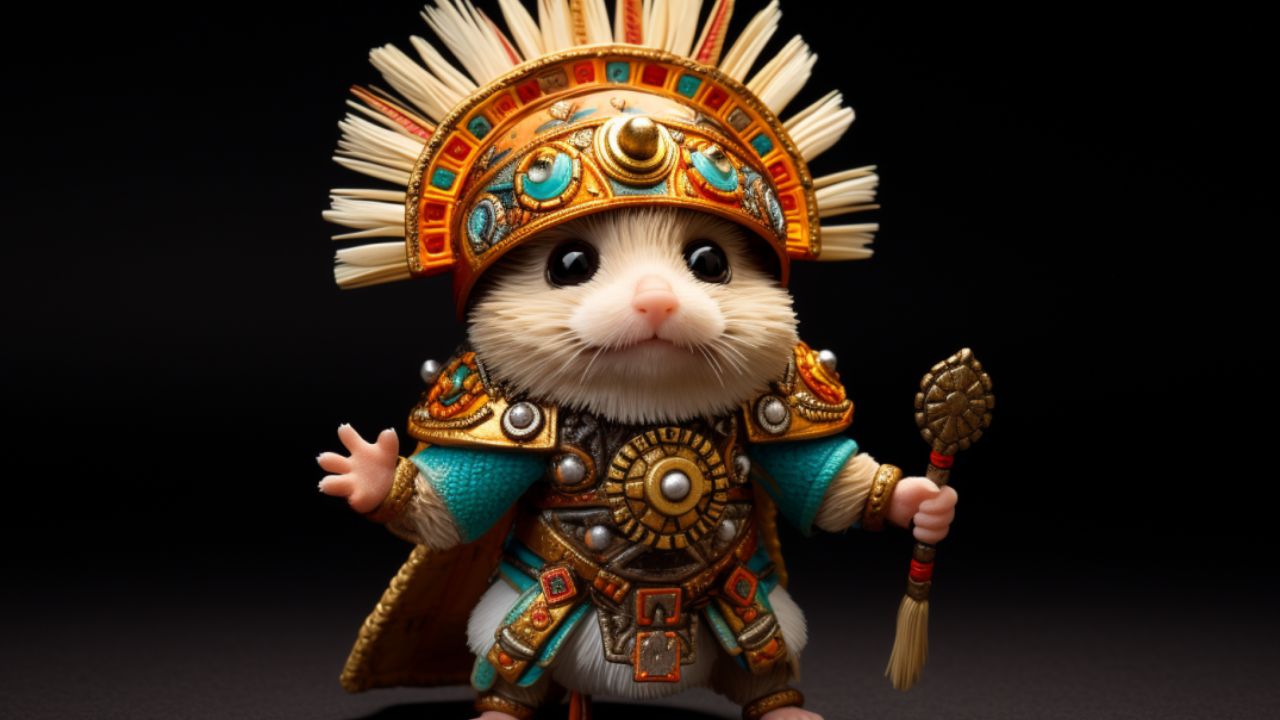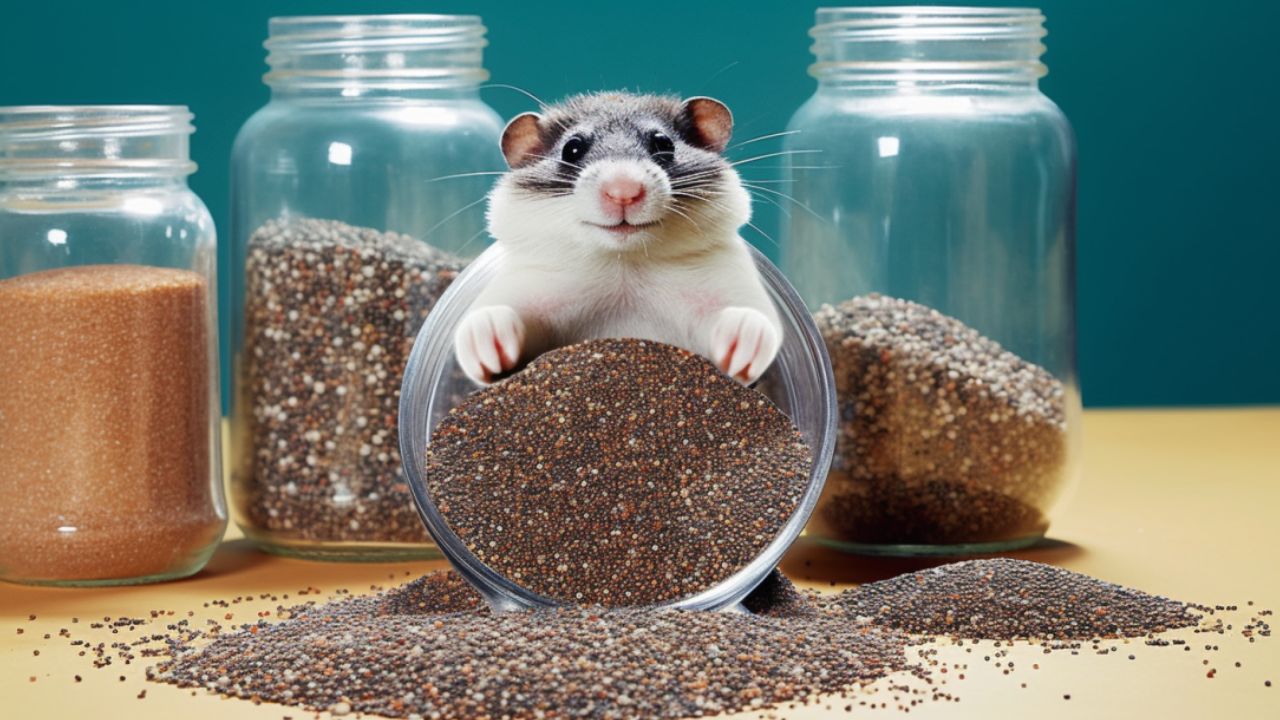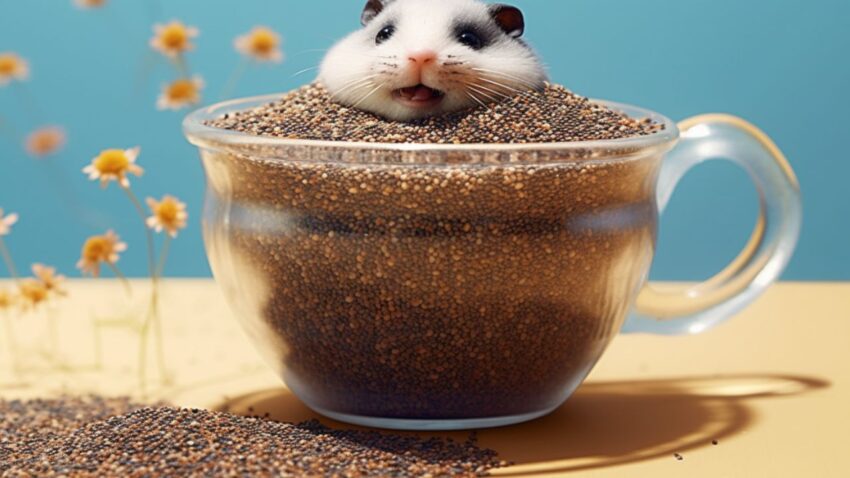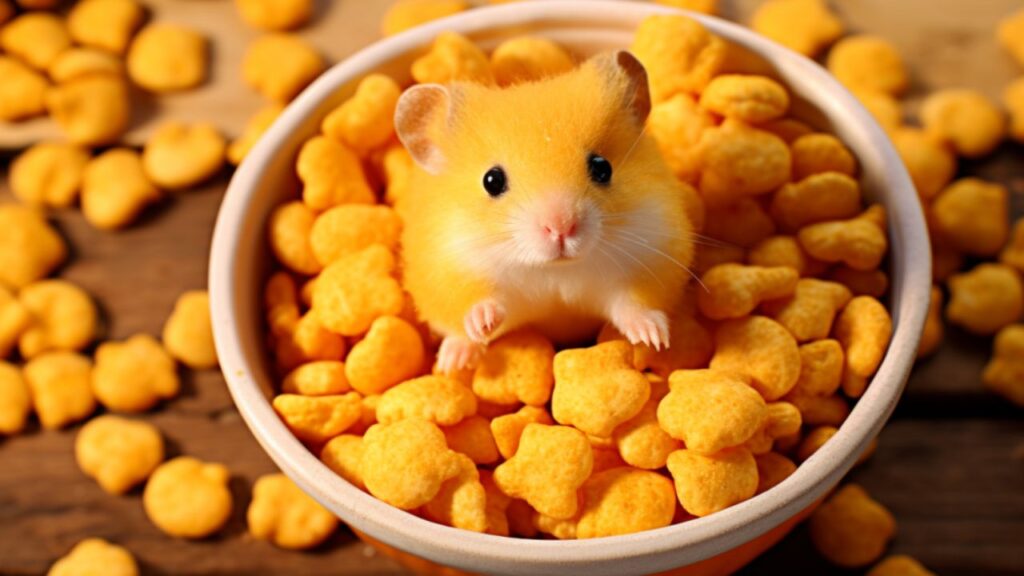TL;DR Summary
Chia seeds, renowned for their rich history and impressive nutritional profile, have become a staple in many human diets. The pressing question is: Are they safe for hamsters? The answer is yes, in moderation. Research and Dr. Whiskerson’s observations confirm that while chia seeds can offer certain health benefits to hamsters, such as vitamins, minerals, and Omega-3s, it’s crucial to introduce them gradually and in the right quantities. Overconsumption could lead to potential health concerns. As always, when introducing any new food, monitor your hamster for any changes in behavior or health. And remember, a happy hamster is a wheel-y happy you!
The Growing Popularity of Chia Seeds in Diets
In recent years, chia seeds have taken the nutritional world by storm. These tiny, unassuming seeds, native to Central and South America, have been revered as a “superfood” for their impressive array of health benefits. Loaded with omega-3 fatty acids, dietary fiber, protein, and a host of essential minerals, chia seeds have become a staple in health-conscious diets. From chia seed pudding and smoothies to being sprinkled over salads, their versatility has made them an appealing option for many looking to boost their daily nutritional intake.
Unearthing the Answer: Are Chia Seeds Safe for Hamsters?
But as with any food trend that gains traction amongst humans, pet owners often wonder: Can our furry companions benefit from these dietary darlings too? Specifically, those in the hamster community may be scratching their heads, contemplating if these seeds are a healthy addition to their pet’s meals. After all, hamsters are known for their varied diets in the wild, consuming an array of seeds, grains, and plants. So, it’s only natural to inquire whether chia seeds can join the list of safe foods for our whiskered friends. As we venture further into this article, we’ll aim to answer this very question, drawing upon scientific research, nutritional data, and my own experiences as a rodentologist.
Chia Seeds 101: A Nutritional Dive

Origins and History: From Aztec Warriors to Modern Health Food
Chia seeds, scientifically known as Salvia hispanica, have an illustrious history that dates back to ancient civilizations. Long before they adorned our breakfast bowls and smoothies, they were a crucial component of the Aztec and Mayan diets. These seeds were so valued that they were often used as a form of currency and were considered a dietary staple for Aztec warriors, providing them with sustained energy during prolonged battles and expeditions.
The name “chia” is derived from the Nahuatl word “chian,” which means oily, hinting at the seed’s rich oil content. Post the Spanish conquest, the importance of chia seeds declined due to their association with indigenous religious ceremonies. However, in the latter half of the 20th century, as the world started recognizing the benefits of these nutrient-packed seeds, their popularity skyrocketed. Today, they’re cultivated in various parts of the world and are heralded as a modern health food.
A Nutritional Goldmine: Vitamins, Minerals, and Omega-3s
The resurgence in the popularity of chia seeds can be attributed to their outstanding nutritional profile. Let’s break it down:
- Omega-3 Fatty Acids: One of chia seeds’ most significant claims to fame is their high content of omega-3 fatty acids, specifically alpha-linolenic acid (ALA). Omega-3s are essential fats that play crucial roles in brain health, inflammation regulation, and heart health.
- Dietary Fiber: These tiny seeds are packed with fiber, essential for promoting digestive health, stabilizing blood sugar levels, and aiding in weight management.
- Protein: Chia seeds are an excellent protein source, especially for those who follow plant-based diets. They contain all nine essential amino acids, making them a complete protein.
- Vitamins and Minerals: Chia seeds are a treasure trove of essential minerals like calcium, phosphorus, magnesium, and manganese. They also contain trace amounts of vitamin B-complex groups, vitamin E, and vitamin A.
- Antioxidants: These seeds are abundant in antioxidants, which help combat oxidative stress and protect the body from damage by free radicals.
In summary, chia seeds aren’t just a trendy health food; they’re nutritionally dense powerhouses that have withstood the test of time. The next pressing question we need to address is whether these nutrients can benefit our hamster companions or if there might be any hidden risks involved.
Chia Seeds and Hamster Health: The Science Decoded

Current Research: What Studies Say About Hamsters and Chia Seeds
As the wave of health consciousness swept through human diets, naturally, the curiosity extended to the diets of our beloved pets, including hamsters. However, it’s pivotal to remember that human-friendly doesn’t always equate to hamster-friendly. So, what does the research say about introducing chia seeds into a hamster’s diet?
Several studies have delved into the effects of different seeds and grains on hamsters, particularly due to their similarity in lipid metabolism to humans. Within these investigations, chia seeds have been introduced to some extent, given their rich Omega-3 content.
The good news? Preliminary findings suggest that chia seeds, in controlled amounts, don’t pose significant health risks to hamsters. Some studies even indicated a potential benefit in lipid regulation, likely attributed to the Omega-3 fatty acids in chia seeds. This could potentially assist in the prevention of fatty liver diseases in hamsters, a common ailment in those fed high-fat diets.
However, it’s worth noting that while the initial research paints a promising picture, it’s not extensive. Most of these studies focus on short-term effects, and there’s still much to uncover about the long-term implications of regular chia seed consumption in hamsters.
Dr. Whiskerson’s Field Notes: First-hand Observations and Findings
Over my years of caring for and observing these delightful rodents, I’ve had the opportunity to experiment cautiously with chia seeds in the diets of a select group of hamsters. Here’s what I’ve gleaned:
- Digestibility: Unlike some seeds that can be tough for hamsters to process, chia seeds, due to their small size, seem to be relatively easily digested. However, it’s crucial to ensure they are given in their dry form and not after being soaked, as swollen chia seeds could pose a choking hazard.
- Acceptance: Anecdotally, most hamsters seem to enjoy the occasional chia seed sprinkled into their food mix. However, like with all foods, preferences can vary from one hamster to another.
- Hydration: Given that chia seeds are hygroscopic, meaning they can absorb and retain water, there’s a potential benefit for hydration. However, this can also mean that when consumed in larger quantities, they might lead to dehydration, as they could absorb water from the hamster’s system. It’s a delicate balance.
- No Adverse Effects Observed: In my controlled and limited introductions of chia seeds, I haven’t observed any immediate negative effects on hamster health. However, I must stress the importance of moderation. Just because a little is good doesn’t mean a lot is better.
To sum up, while my observations and the current body of research suggest that chia seeds can be a safe and potentially beneficial addition to a hamster’s diet, it’s essential to proceed with caution and always prioritize your pet’s health and well-being.
Potential Benefits and Concerns

As with introducing any new element into an animal’s diet, it’s crucial to weigh the potential benefits against the potential risks. Chia seeds, while being a superfood for humans, present both pros and cons when considering their introduction into a hamster’s dietary regimen.
The Pros: How Chia Seeds Might Benefit Hamsters
- Rich in Omega-3 Fatty Acids: Chia seeds are a potent source of Omega-3 fatty acids, which play a crucial role in maintaining heart health and regulating cholesterol. For hamsters, these fatty acids could be beneficial in ensuring a healthy cardiovascular system, especially considering the rapid heart rate of these small creatures.
- Aid in Digestion: Chia seeds contain a significant amount of dietary fiber, which can be beneficial in promoting healthy digestion and preventing constipation. For hamsters, whose diets predominantly consist of grains and seeds, the additional fiber might aid in smoother digestion.
- Natural Hydration: As mentioned earlier, chia seeds have a unique ability to absorb and retain water, which can potentially help in keeping hamsters hydrated. This can be especially helpful in drier environments where water loss might be a concern.
- Protein Content: Chia seeds are a good source of protein, which is essential for muscle building and repair. For active hamsters, this protein can support their energetic lifestyles and help in maintaining healthy muscle tone.
The Cons: Possible Side Effects and Hazards
- Risk of Overhydration: While the hygroscopic nature of chia seeds can be a hydration boon, there’s also a risk of overhydration, or water intoxication. If hamsters consume too many chia seeds that have been soaked in water, it might lead to a potentially dangerous imbalance in their internal water levels.
- Choking Hazard: If chia seeds are introduced in their soaked, swollen form, they could pose a choking risk. These expanded seeds could become lodged in a hamster’s throat, leading to distress or even asphyxiation.
- Overconsumption: Like all good things, chia seeds should be given in moderation. An excess intake could lead to digestive issues or nutrient imbalances. It’s essential to ensure that chia seeds don’t replace other vital components of a hamster’s diet.
- Allergic Reactions: Though rare, there’s always a potential for allergic reactions when introducing new foods. While chia allergies are uncommon, it’s always good to monitor your hamster for any signs of distress or adverse reactions after consuming chia seeds.
In conclusion, while chia seeds hold promise as a beneficial addition to a hamster’s diet, they should be introduced with caution. Monitoring the quantity and ensuring they are provided in their dry form can mitigate most of the associated risks. Always prioritize the well-being of your furry friend and consult with a veterinarian if you have any concerns.
Whisker Tips

Navigating the dietary needs of our pocket-sized companions can sometimes seem like traversing through a hamster-sized maze. With foods as nutrient-dense and popular as chia seeds, it’s crucial to implement them with caution and knowledge. Here are some of Dr. Whiskerson’s renowned “Whisker Tips” for doing just that:
Seed by Seed: Introducing Chia to Your Hamster’s Diet
- Start Small: Like any new dietary introduction, it’s essential to start with a minimal amount to gauge your hamster’s reaction. Initially, sprinkle just a couple of dry chia seeds into their regular feed.
- Monitor Behavior: After the first introduction, keep an observant eye on your hamster. Look for any changes in their behavior, activity level, or any signs of distress. While chia seeds are generally safe, every hamster is unique.
- Consistency is Key: Chia seeds should be introduced in their dry form to reduce the risk of choking. Soaking them might be ideal for human consumption, but for our furry buddies, dry seeds are the safer bet.
- Gradual Increase: If your hamster seems to be enjoying the chia seeds without any adverse reactions, you can gradually increase the amount over several days. This slow introduction helps their digestive system adjust to the new component.
Measuring Up: The Ideal Quantity and Frequency
- Limit the Quantity: While chia seeds are nutritious, they are also potent. For a creature as small as a hamster, a little goes a long way. A pinch (around 2-3 seeds) every couple of days is more than enough to provide the benefits without overdoing it.
- Avoid Daily Feeding: Due to the high fiber content and other potent nutrients, it’s not recommended to feed chia seeds to hamsters daily. Instead, think of them as a treat or supplement, introducing them into the diet every other day or even just a couple of times a week.
- Diversify the Diet: Remember, chia seeds should not replace any essential components of your hamster’s regular diet. They should be an addition, not a substitution. Always ensure a balanced diet for your hamster, comprising primarily of their standard hamster food pellets, along with occasional fruits, veggies, and other treats.
In wrapping up this section, the key is moderation. While it might be tempting to share our superfoods with our pets, always remember their dietary needs and limitations are vastly different from ours. As always, when in doubt, seek guidance from a vet or rodent specialist. And remember, every hamster is unique – so always be attuned to their specific needs and reactions.
FAQs: Chia Seeds for Hamsters

In the realm of hamster nutrition, questions abound. With the rising popularity of chia seeds as a health food for humans, it’s no surprise that many hamster owners are curious about its potential benefits and risks for their petite pals. Let’s address some of the most frequently asked questions about introducing chia seeds into a hamster’s diet.
Top Questions: Demystifying Chia in the Hamster World
- Can I feed my hamster chia seeds directly from the packet?
- How often should I give my hamster chia seeds?
- Are there any specific health benefits of chia seeds for hamsters?
- Can chia seeds cause any digestive issues in hamsters?
- Is it better to give my hamster whole chia seeds or chia gel?
Dr. Whiskerson’s Comprehensive Responses: Myth-busting and Clarifications
- Can I feed my hamster chia seeds directly from the packet?
Answer: Yes, you can. However, ensure the seeds are fresh, free from any contaminants, and have been stored in a cool, dry place. It’s always a good idea to buy chia seeds from reputable sources to guarantee their quality. - How often should I give my hamster chia seeds?
Answer: Chia seeds should be introduced as an occasional treat rather than a daily staple. Start with a tiny amount once a week and observe your hamster for any changes in behavior or digestion. Adjust the frequency based on your hamster’s individual needs and tolerance. - Are there any specific health benefits of chia seeds for hamsters?
Answer: Chia seeds are packed with omega-3 fatty acids, which can support healthy skin and a shiny coat. They also contain fiber, which can aid digestion, and various essential minerals beneficial for overall health. However, like all treats, they should be given in moderation to avoid potential side effects. - Can chia seeds cause any digestive issues in hamsters?
Answer: While chia seeds offer dietary fiber, which is generally beneficial for digestion, they can absorb a lot of water and swell up. This means if given in excessive amounts, they could potentially lead to digestive discomfort or blockages. Always ensure your hamster has access to plenty of fresh water when feeding chia seeds and monitor for any signs of digestive distress. - Is it better to give my hamster whole chia seeds or chia gel?
Answer: Whole chia seeds are typically the preferred option since they can be sprinkled over the regular diet in small amounts. However, if you choose to offer chia gel (chia seeds soaked in water), ensure it’s made with fresh water and given in minimal quantities. Remember, the key is moderation.
Navigating the complex landscape of hamster nutrition can be challenging, but with a blend of scientific understanding, personal observations, and community insights, we can make informed choices that promote the well-being of our beloved rodents.
The Chia Seed Verdict

As we conclude our in-depth exploration into the role of chia seeds in the hamster diet, it’s essential to take a moment and reflect on the evidence at hand. With the mounting popularity of chia seeds in human diets, understanding their impact on our furry companions is of paramount importance.
Weighing Up the Evidence: To Feed or Not to Feed?
Chia seeds undoubtedly come with a plethora of nutritional benefits, from omega-3 fatty acids that can lend a glossy sheen to a hamster’s coat to the essential minerals that support their overall well-being. However, as with all dietary introductions, the devil is in the details—or in this case, the dosage.
While the scientific community has yet to produce a plethora of studies specifically targeting hamsters and chia seeds, the preliminary evidence combined with firsthand observations suggests that chia seeds can be a beneficial addition to a hamster’s diet when administered correctly. It’s clear that chia seeds can be a delightful treat, but moderation is crucial. Overfeeding can potentially lead to digestive discomfort, emphasizing the importance of controlled and monitored introduction.
Prioritizing Hamster Health: The Ongoing Commitment
Our journey into the world of chia seeds underscores a broader theme: the unwavering commitment to understanding and prioritizing the health of our hamsters. The ever-evolving world of nutrition means that we must remain vigilant, continually seeking out new information, asking questions, and observing our hamsters’ responses to dietary changes.
Incorporating chia seeds into a hamster’s diet is more than just a decision about a single food item—it’s a testament to the broader commitment every hamster owner makes to ensure the happiness and health of their pet. As we move forward, let’s remember the core principle that guides all our decisions: the well-being of our beloved furry companions. Whether it’s chia seeds today or another food item tomorrow, let’s continue our quest for knowledge, always with the best interest of our hamsters at heart.
Dr. Whiskerson’s Seedful Sign-off

As we reach the tail end of our in-depth chia seed exploration, it’s a moment to pause, ponder, and reflect on the journey we’ve embarked upon together. The world of rodent nutrition is vast, intricate, and perpetually expanding, and as always, I’m honored to serve as your guide through its many twists and turns.
Reflecting on the Chia Seed Journey
The narrative of chia seeds, from their ancient Aztec roots to their place on modern health food shelves, serves as a beautiful testament to the enduring quest for nutrition, well-being, and the holistic understanding of the foods we consume. Our venture into understanding its place in a hamster’s diet exemplifies the broader journey we all embark upon as devoted caregivers, seeking to demystify the best dietary paths for our petite companions.
Together, we’ve weighed the pros and cons, delved into scientific studies, heard from fellow hamster enthusiasts, and even shared some chuckles along the way. It’s my hope that this exploration has not only equipped you with the knowledge about chia seeds but has also instilled a renewed sense of curiosity and commitment towards understanding every aspect of hamster health.
The Signature Goodbye
As we bid adieu to this chapter of our nutritional odyssey, always remember the underlying theme that threads through all our endeavors: the well-being and happiness of our hamsters. In every seed we introduce, in every meal we prepare, let’s continue to prioritize their health, joy, and longevity.
With a heart full of gratitude and a wheel full of energy, I leave you with my signature sentiment, dear readers: “Remember, a happy hamster is a wheel-y happy you!“ Until our next furry foray, keep those whiskers wiggling and those tails twitching!




